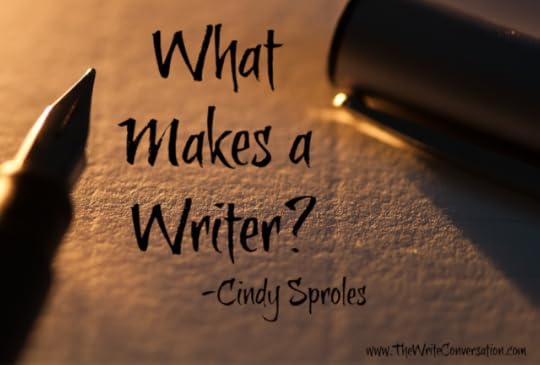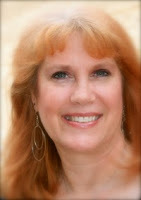What Makes a Writer?

by Cindy Sproles @CindyDevoted
The joy found in helping new authors is fulfilling. It brings a smile to my face when I find a writer who has a burning desire to learn. I met such a man after he contacted me with the news he’d read my novel. He told me he was making the transition from writing non-fiction to fiction and he had a novel in the works.
It was obvious Daniel had talent. The question would be, did the talent belong to a person with a willing heart? I pondered a while then sent a note and asked if he had an open mind. He did and so over the next week, we worked together picking apart that first chapter. I gave him books to read, power points, information on writing fiction and as quickly as I sent it to him, he devoured it, returning rewritten work the next day. Daniel wanted to learn to write fiction. As much as it pained him to let go of some of the descriptions, he saw the importance of the story and daily he pounded out, refined, and rewrote the entire story.
What is my point?
Lots of writers do this daily. What was different about this man? His desire to tell the story overrode the desire to be a published writer and he was willing to sacrifice what he’d done to make it right.
The call to be a writer entails more than simply writing to write a story. My first conference, I sat in a class with Len Goss from Broadman & Holman Publishing. I wrote down his first two lines to the class. “Everybody has a story. What makes you think yours is publishable?”
Not only was that a shock to my dreams of being a writer but it was one of the most valuable things I’ve ever heard. Everybody has a story. What makes me think mine is any better than the next? From that point on, Goss talked about learning to submit to the rules of the craft and the industry. It was a hard class to sit through because I, like many other brand new writers, thought publishing would be simple. I thought once I wrote my story, it was done and I didn’t understand the craft. I saw that day, there was a lot to being a writer and it must begin in my heart.
I learned three very valuable things from that class I’d like to share with you.
Have the right heart Who would have thought writing required having the right heart, but it does. When you have the heart to learn and the willingness to listen, then you’ve taken the first step to publication. To be a good writer you must be willing to be teachable and that truly is a “heart” thing. Many first-time writers come into conferences believing they have it all. They assume their story is perfect and when they meet with rejection, they grow angry. I sat at a conference with a woman who insisted her story was going to be published and if I didn’t want it, she’d just pay to have it published because that was the easiest way anyway.
When I asked her why she thought to publish it herself was easier, she replied emphatically that “they” would sell the book and it would be on Amazon. Though I never found out who “they” was it was clear she had no desire to listen to suggestions or experience. She didn’t have the right heart and though she could easily self-publish a book, she had no desire to understand or learn what it entailed. Her only desire was a published book.
HINT: Just because a book is listed on Amazon does not mean it will sell. According to Amazon, there are 32.8 million books listed on their site. Amazon does not sell your book for you. They are a distributor who the average Joe can purchase single quantities from rather than in bulk. Someone has to take the initiative to sell the book and in the case of someone who publishes on their own—they become the sole seller.
Seeking guidance and trainingAnother point Goss made was, as a new writer, we were doing exactly what we should be doing. Learning. There are tons of books on the craft of writing and you can learn amazing things from books like Story Trumps Structure by Steven James or Plot and Structure by James Scott Bell or the oldie but goodie, Stein on Writing by Sol Stein, but there is nothing any better than sitting at the feet of experienced authors who have successfully muddled the publishing maze and learned the ways to craft tighter, better stories. Seek guidance and training. Just do it.
Conferences are the perfect place to do that. Many successful authors are launching mentoring sites where you can purchase their expertise and receive one-on-one guidance. This is valuable. On a personal note, I remember sitting at that same first conference watching Eva Marie Everson, Ann Tatlock, Alton Gansky, and Yvonne Lehman wishing I could just be their friend, learn from them—and because of networking at conferences and attending their classes, I can now call them all valuable, close friends and mentors. Once again, seek guidance and training.
Persistence pays offThose who continue to pursue the dream, work to learn, and refine eventually find publication. It is important to remember the words of Alton Gansky, “Your book may not be meant to sit on the shelves of a bookstore, but they may only be meant for the guy sitting next to you.” The truth is, if you keep at it, you will find success in your writing, in the growth from your writing and in the opportunities that arise which you never expected.
As for Daniel…his book is now published because he was willing to do the necessary work it took to make the book successful. That first class by Len Goss was hard to swallow as a new conferee and writer, but looking back it was, bar none, the most valuable class I’ve ever taken.
What makes a writer? Practice, practice, practice.
*Check out Daniel Overdorf’s book A Death Well Lived
TWEETABLEWhat Makes a Writer? Thoughts from @CindyDevoted on @EdieMelson (Click to Tweet)
 Cindy K. Sproles is an author, speaker, and conference teacher. She is the cofounder of ChristianDevotions.us and the executive editor of ChristianDevotions.us and InspireaFire.com. Cindy is the managing editor for Straight Street Books and SonRise Devotionals, both imprints of Lighthouse Publishing of the Carolinas. She is an award-winning and best-selling author and the director of the Asheville Christian Writers Conference. Visit Cindy at www.cindysproles.com. @cindydevoted
Cindy K. Sproles is an author, speaker, and conference teacher. She is the cofounder of ChristianDevotions.us and the executive editor of ChristianDevotions.us and InspireaFire.com. Cindy is the managing editor for Straight Street Books and SonRise Devotionals, both imprints of Lighthouse Publishing of the Carolinas. She is an award-winning and best-selling author and the director of the Asheville Christian Writers Conference. Visit Cindy at www.cindysproles.com. @cindydevoted
Published on May 11, 2020 22:00
No comments have been added yet.



